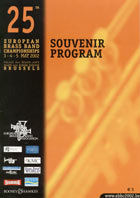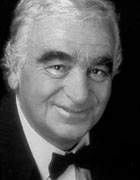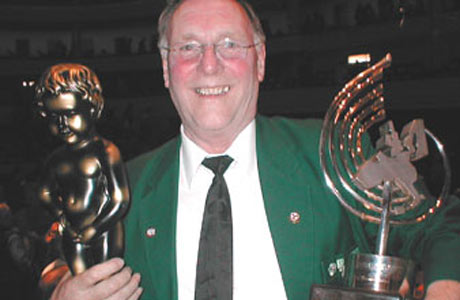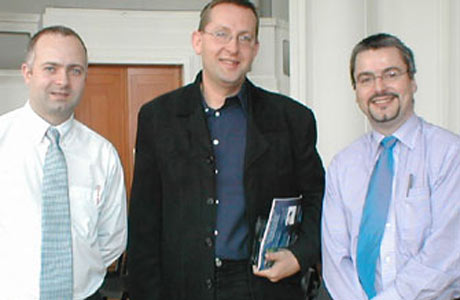4BR Time Team - Brussels 2002
27-Apr-2009The last time the European came to Belgium, it provided some memorable playing - for the right and wrong reasons...
 There was something rather appropriate that the 25th European Brass Band Championships took place in Brussels in 2002.
There was something rather appropriate that the 25th European Brass Band Championships took place in Brussels in 2002.
Weekend to savour
The spiritual home of the brass instrument had long been seen as an ideal venue to celebrate the silver anniversary, and blessed with perhaps the strongest ever line up of competing bands there was a sense that Palais des Beaux-Arts would provide a contesting weekend to savour.
It did and it didn’t.
For such a cultural jewel of a city Brussels only fleetingly embraced the contest. The welcome was warm and friendly, but beneath the usual platitudes of the local dignitaries there was no escaping the fact that the contest was not being promoted locally as a ‘must see’ event – not even for the Brusselèèrs themselves.
Faded glory
The Palais des Beaux Arts reminded you somewhat of the Winter Gardens in Blackpool – all stucco and faded glory. Cramped and dusty, it had seen better days (about 1953 by the looks of it) but crucially it did provide a contesting stage that offered an excellent acoustic.
The line up of competing bands was perhaps the strongest in the events history too, with YBS under David King looking to make it six wins out of seven and equal Black Dyke’s record of four consecutive victories. Despite the obvious strength of the field, including their Yorkshire rivals making their first appearance since 1996, YBS were overwhelming favourites.
Maurice Andre
The whole event kicked off on the Friday with a marathon day that started with the Final of the European Composer’s competition and the five bands in the First Section contest and ended with the Celebration Concert with Brass Band Buizingen and Maurice Andre. The Maurice Andre.
The first part went wonderfully well. Brass Band Nord-Pas-de Calais taking the First Section title with a pair of performances that wouldn’t have been out of place in the Championship contest 24 hours later.
Meanwhile, a young Simon Dobson was crowned the victor in the 2nd European Composer’s competition after his ‘Four Britten Sketches’ delighted the capacity audience in the hot Palais theatre.
Disaster
Then – disaster.
With expectation almost at fever pitch we awaited the appearance of Maurice Andre buoyed by the type of memories of the great man’s playing that still sent a shiver down the spine.
What followed was a nightmare of interminable embarrassment.
 Corrupted
Corrupted
From the moment Andre (right) shuffled onto the stage looking disinterested and sounding woefully under rehearsed, all our memories were corrupted. Only the excellence of Luc Vertommen with Buizingen saved the evening from descending into musical farce.
Andre was a not even a shadow of his former self – his playing turned to dust. His son meanwhile, dragged into performing with his father through an act of cruel parental nepotism didn’t have enough talent to even cast a musical shadow of any consequence at all. Their contributions were not embarrassing – just sad.
Andre departed, after stopping halfway through one solo, a tragic figure, unable even to acknowledge the sympathy of an audience stunned by a display of mortality that horrified the soul.
Brass Band World’s Alan Jenkins was close to tears when we met him afterwards – a fellow musician who appeared as if he had witnessed a close family bereavement.
Different memories
Thankfully, the Saturday provided memories of a different kind.
The contest still required the competing bands to perform twice on the same day, (it changed the following year) so the draw for the main event still held a great deal of importance.
Charm bracelet
On the stroke of 10.00am, Eikanger delivered the first performance of Piet Swerts ‘Chain’ – a piece that as the name suggested reminded you of a musical charm bracelet – a series of monotonous links interspersed with the occasional bit of showcase bling to catch the eye.
9 performances came and went, but it was not until YBS took to the stage as the 10th and final band that we finally heard the piece in all its glory – a performance hallmarked by tempered ensemble security and flashes of artistic brilliance – none more so than Sheona White was performed the horrendously difficult horn part with a facility that was stunning in its execution.
Distance
YBS was a distance in front in defence of its title, despite the judges only marking them a point ahead of Willebroek, who were a further point ahead of Black Dyke.
The draw for the own choice selections had been kind to YBS too – eighth out of the hat, whilst the Belgians of Willebroek had to set the marker off the number 1 slot, with Dyke at 10, and Eikanger (perhaps the only other band in with a realistic chance of glory) playing fifth.
Willebroek laid down an impressive marker with ‘…Dove Descending’, a performance that couldn’t be matched by the following bands of Concord Brass, CWA Brass, Tredegar, Eikanger (who played the same piece), CWS (Glasgow) and Brass Band De Bazuin Oenkerk. Then came YBS AND ‘Concerto Grosso’.

YBS take the Pis - Ted Griffiths holds the Euro trophies after their 2002 victory...
Visceral
This was something of a risky choice in many people’s eyes – a tour de force of a piece that had only been played once before at the contest, but David King was always just one step ahead of his rivals and knew he had just the right personnel to fully justify his selection.
Some 20 minutes later, everyone in the packed auditorium agreed too – a visceral performance of such intensity that fully justified its 99 point marking. The contest was over.
Black Dyke followed with ‘Revelation’, which although excellently played, seemed almost too civil in comparison to the feral beast heard before.
Test the patience
4BR was seated in the box next to the judges at the back of the hall, and within two minutes of the last note of Dyke’s performance James Gourlay, Yves Illi and Manu Mallaerts had made their decision and we on their way for a refreshing pint of the local lambic beer. They knew a clear cut winner when they had heard one.
All that was left was the test of patience that had to be endured with the overlong Gala Concert later that night.
Concert contest
Cruelly it saw YBS and Black Dyke renew musical battle for a third time that day as the reigning champions performed the first half of the concert and their putative rivals for their crown, the second.
As earlier in the day, it was no contest: YBS, buoyed by expectation and Philip Sparke’s ‘Hymn of the Highlands’ were irresistible, bringing the house down (Peter Roberts especially with a premiere rendition of ‘Flowerdale’ that resulted in a standing ovation that lasted longer than their piece itself).
Dyke by comparison had the rather less substantial ‘Call of the Cossacks’, which although as tricksy as a Vodka fuelled night out in Moscow, was simply a lightweight response to a startling display of virtuosity. Dyke knew the writing was on the wall well before they finished.
And so it proved.

The way we were... The 4BR team of Anthony Banwell and Iwan Fox meet composer Piet Swerts
Trump card
YBS won the 2002 European title by six points – and it could have been more. Not until the MD played his final trump card of ‘Music of the Sphere’ two years later with the bands final European success did they ever dominate the contest so comprehensively.
Willebroek claimed second place with a display of growing maturity that would flower just a few years later, whilst Black Dyke came third – their eventually opportunity of delivering an equally emphatic victory coming in 2005. The rest of the field were also rans.
Magnificent return
That night YBS celebrated like never before, with representatives of the sponsors enjoying a quite magnificent return on their investment – one that still had a few years left to run.
For the band it was their sixth and more comprehensive victory to date – until Brussels their biggest winning margin had been two points. For David King it was his eighth success, with the promise of more to come too.
For the European contest itself, the victory had saved the contest from a 25th anniversary that perhaps would have been remembered for all the wrong reasons too.
Iwan Fox















